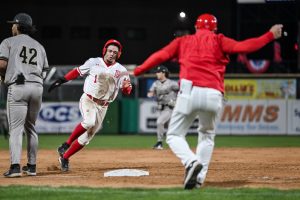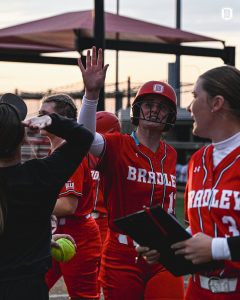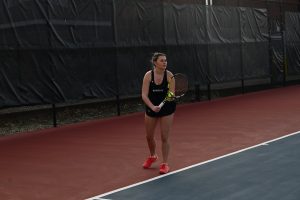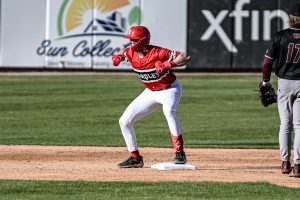The path for many college baseball players is not the traditional route that other student athletes take. For example, ten of the 31 players on the Bradley baseball team played for junior college teams before coming to Bradley.
This comes from Division I baseball being competitive, often requiring student athletes to play junior college for a couple years before moving to the next level. Junior pitcher Cole Cook, from Washington, Illinois, said he chose to attend Illinois Central College because it was the best option for him.
“I only had like one [Division III] school that was really interested in me,” Cook said. “I decided ICC gave me more opportunities to move onto the next level, as well as stay local so my family could come to games.”
Another junior college transfer, junior pitcher Bobby Johnson, who played at Fort Scott Community College in Kansas, said the size of his high school contributed to his limited college options.
“I went to a really small high school,” Johnson said. “It was pretty much my only option, and I really wanted to play baseball.”
While many think of junior college as a low level of play, Cook said he was challenged at the junior college level compared to high school.
“The speed of the game was a lot faster,” Cook said. “You definitely couldn’t make as many mistakes with pitches. Luckily, it was a smooth transition, and I was able to play well and make it to Bradley.”
Because of this, Cook described playing junior college baseball as a “grind.”
“[Junior college baseball] is definitely a grind because you aren’t able to charter a flight,” Cook said. “It is long drives, long hours and long games. It definitely makes playing Division I a lot better.”
As for Johnson, he shared the same sentiment as Cook.
“There is for sure no off days,” Johnson said. “It is pretty much 7 a.m. to 6 p.m. of just playing baseball. I made a lot of good buddies though.”
Unlike NCAA Division I baseball, where there are rules for just about everything, Cook said junior college baseball is quite the opposite.
“There are basically no rules in junior college about length of practice times. You can [practice] as long as you want,” Cook said. “It is kind of like the Wild West.”
Cook said Bradley was a school he always hoped he would be able to play for.
“From sixth grade on, I went to school with [junior] Christian Dominguez, who is [head] coach [Elvis Dominguez’s] son,” Cook said. “It was always a destination I wanted to play at, and it was a dream come true when I was able to make it.”
Cook played just one year at ICC before transferring to Bradley and Johnson played two years at Fort Scott and is in his first year with the Braves. Both of the pitchers said they have had different experiences transitioning to Bradley.
“My first fall it was kind of a shock to me,” Cook said. “It was so much harder because I had to be perfect with my spots. I didn’t do very well, and I just had to focus on making sure I had control of every pitch.”
“Going to Bradley hasn’t been as big of a change that high school to [junior college] was,” Johnson said. “Fort Scott prepared me well.”
Cook and Johnson have been successful on Bradley’s pitching staff. Cook has emerged as one of the top pitchers in the starting rotation last season, and Johnson has already racked up three saves for the Braves this year, out of the bullpen.




